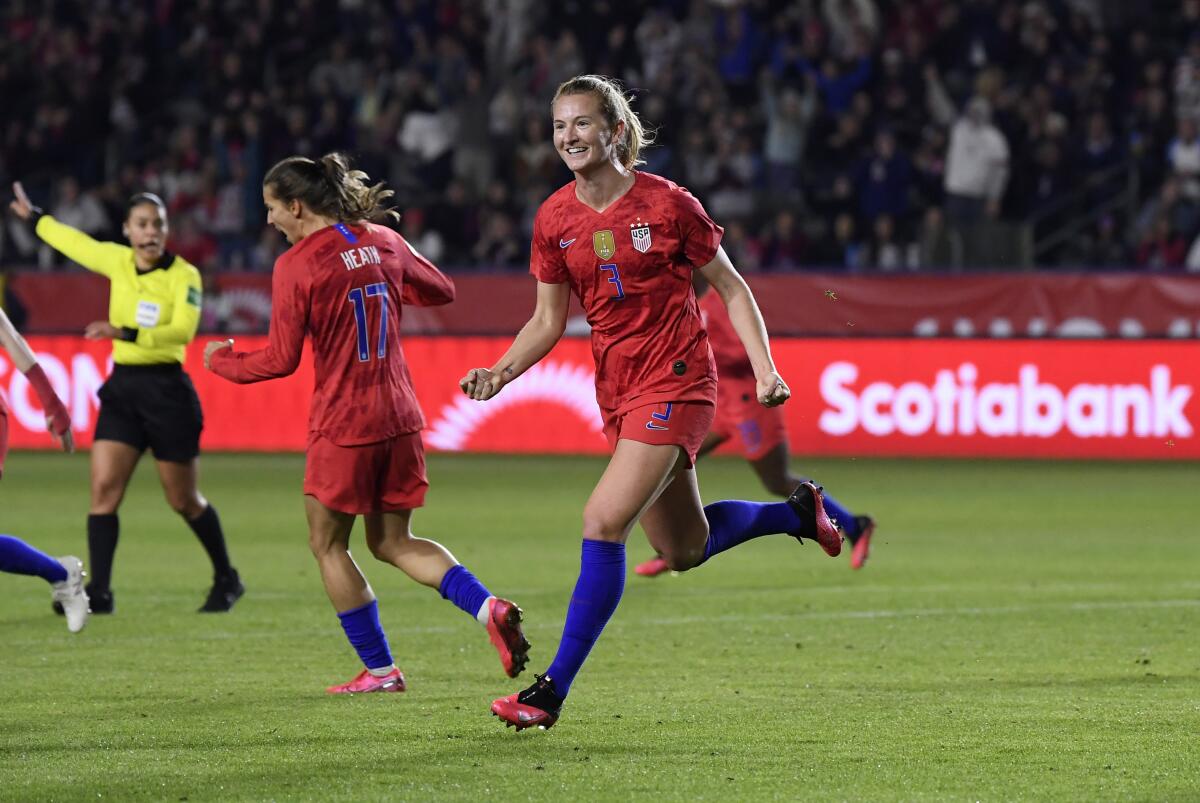U.S. and Canada secure women’s soccer berths in the 2020 Tokyo Olympics

- Share via
There wasn’t a whole lot of suspense heading into Friday’s semifinals of the CONCACAF women’s Olympic qualifying tournament.
Sure there were two spots in this summer’s Games in Tokyo up for grabs. But everyone knew who was going to grab them.
The U.S., ranked No. 1 in the world, has never lost a qualifying game and has never failed to qualify for the Olympics. Canada, the world’s eighth-best team, hasn’t lost a qualifier to anyone but the U.S. since 2004, the last time it failed to reach the Summer Games.
And both teams played to form before a crowd of 11,292 at Dignity Health Sports Park, with the U.S. grabbing its ticket to Tokyo by overwhelming Mexico 4-0 behind goals from Rose Lavelle, Christen Press and two from Sam Mewis while Canada earned its berth by outlasting stubborn Costa Rica 1-0 on Jordyn Huitema’s second-half score.
Canada and the U.S. will meet in Sunday’s tournament final in Carson, a game in which nothing more than pride will be at stake.
“Every time you’re in a final, you go for the win,” Canadian coach Kenneth Heiner-Moller said.
Maybe. But his team hasn’t gotten one against the U.S. since 2001.
Bayern Munich needs a win Sunday to keep its tentative grasp on the top spot in the Bundesliga while Barcelona can reclaim the lead in Spain’s La Liga in top soccer leagues this weekend.
And the Americans looked dominant again against Mexico in a game that was far more one-sided than the final score, with the U.S. outshooting Mexico 26-6, completing nearly twice as many passes and holding the ball for 60 of the 90 minutes.
Yet coach Vlatko Andonovski insists his team can get better.
“Individually we can get better and we can get better as a team,” he said. “Regardless of how well we do, we will always find something to push this team and it seems like this team embraces those challenges.
“That’s the thing: getting better every day.”
They were good from the start Friday with Lavelle’s long, left-footed shot through the legs of Mexican midfielder Karla Nieto giving the Americans a 1-0 lead before the game was five minutes old.
Mewis doubled the lead in the 14th minute, getting on the end of a low Megan Rapinoe corner that bounced three times before Mewis volleyed it home from the center of the penalty area.
Mewis, a UCLA product, made it 3-0 in the 67th minute, drilling home a free kick from just outside the box for her fourth goal in her last two games. Press ended the scoring six minutes later, chipping a rebound over Mexican keeper Emily Alvarado to run her goal-scoring streak to six consecutive games and allow Carli Lloyd to breathe a sigh of relief.
“We didn’t really want to take anything for granted. So it’s just kind of good to kind of get that elephant out of the room [and] seal it for us to go to Tokyo,” said Lloyd, who will be playing in her fourth Olympics. “This team has loads of talent. The best is yet to come.
“It’s just exciting.”
In the first game, Canada struggled to solve a well-organized Costa Rican defense before Huitema’s seventh goal of the tournament in the 72nd minute.
With Costa Rica keeping seven players behind the ball, Canada didn’t put a shot on goal until Janine Beckie’s try just after the hour mark.
Eleven minutes later, second-half substitute Deanne Rose sent a low pass from the right wing into the center of the box for Huitema, who pushed her first shot off the far post. The rebound caromed right back to the Paris Saint-Germain midfielder, and with Costa Rican keeper Maria Bermudez out of position, Huitema calmly slotted the ball in with her left foot.
Canada, the only women’s team to reach the podium of the last two Olympics, hasn’t given up a goal in this year’s qualifying tournament, outscoring opponents 23-0 in four games. The U.S. has outscored four opponents 22-0, running its unbeaten streak on home soil to 44 games.
Which is why there was never any doubt the rest of CONCACAF was playing for third place even before this tournament kicked off.
“We have two giants in this region in the United States and Canada,” Mexican coach Christopher Cuellar said. “It’s not easy to compete with those types of teams.”








